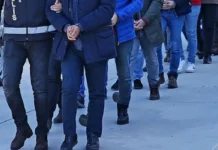The wife of Caner Durukan, 42, who died from cancer shortly after being released from prison two years ago, has said her husband was a victim of gross negligence.
Speaking to the Bold Medya news website, Sibel Durukan said by the time her husband was released he could barely speak or even breathe. “The tumor had already spread considerably,” she said. “He was constantly losing weight in prison, but he hadn’t even gone through any medical examinations. His cancer diagnosis came very late.”
According to Sibel Durukan her husband suffered from stomach pain, loss of appetite and constant vomiting but instead of conducting a thorough medical examination, the doctors prescribed Caner Durukan pills for his stomach. However, he was actually suffering from colon cancer at the time that eventually spread to his liver.
Caner Durukan was a state healthcare worker before he was arrested in April 2017 for alleged links to the Gülen movement. He was sentenced to six years, three months in prison. During his imprisonment Caner Durukan was sent to two different prisons, both of which were overcrowded and where he had to sleep on the floor.
On the day of his last court appearance, on February 6, 2018, Caner Durukan was so weak that the court ordered a thorough medical examination. He was diagnosed with colon cancer, but although the tumor was removed, the disease had spread to other parts of his body.
Caner Durukan, who was released after a hearing on June 3, 2020, passed away after two months in the hospital.
“My husband fought for his life until the very end,” said Sibel Durukan. “He was determined to get better and eventually clear his name. He also wanted the prison authorities who neglected his health to be held accountable.”
Turkey’s President Recep Tayyip Erdoğan has been targeting followers of the Gülen movement, a faith-based group inspired by Turkish cleric Fethullah Gülen, since the corruption investigations of December 17-25, 2013, which implicated then-prime minister Erdoğan, his family members and his inner circle.
Dismissing the investigations as a Gülenist coup and conspiracy against his government, Erdoğan designated the movement as a terrorist organization and began to target its members. He intensified the crackdown on the movement following a coup attempt on July 15, 2016 that he accused Gülen of masterminding. Gülen and the movement strongly deny involvement in the abortive putsch or any terrorist activity.
The purge of thousands of dissidents in the aftermath of the coup has filled Turkey’s prisons, which today are overcrowded with tens of thousands of political prisoners.
Turkish authorities have denied political prisoners, even those with critical illnesses, release from prison so they can at least seek proper treatment. Human rights activists and opposition politicians have frequently criticized authorities for not releasing critically ill prisoners.
Lawmaker Ömer Faruk Gergerlioğlu said ill prisoners were not released until they were at the point of no return. He claimed that prisoners did not have access to proper healthcare facilities such as hospitals and clinics.















